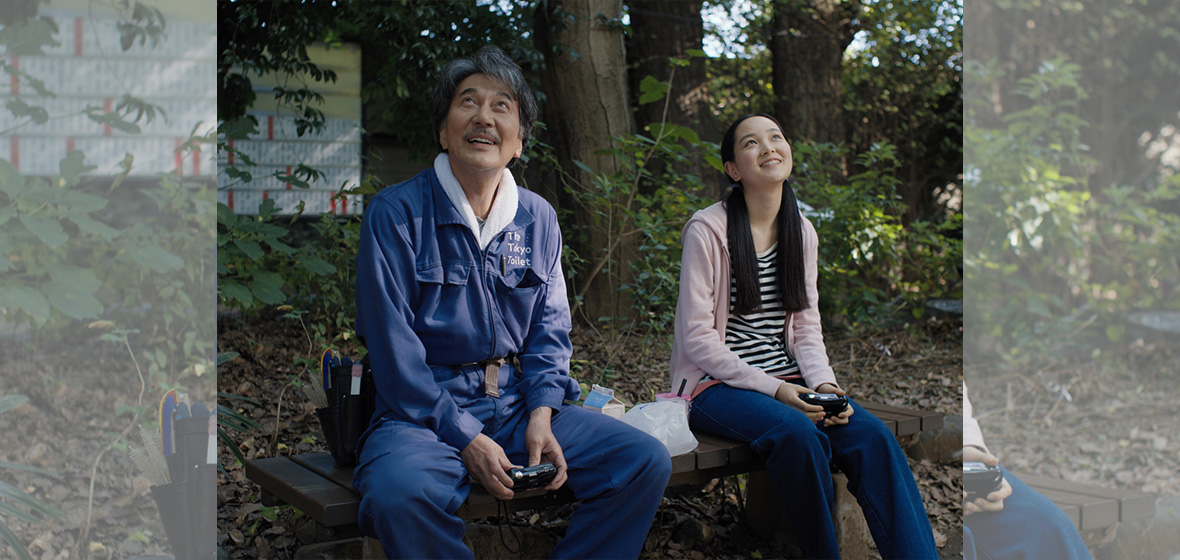Every day, except on Sundays, Hirayama (Koji Yakusho) wakes up before the sun is up. He folds his futon and pillow neatly in the corner of the room. He washes, gets dressed, and carefully sprays his plants with water. He grabs his belongings before leaving home – his keys, mobile phone, an old camera, and some coins, which he uses as soon as he steps out to buy a can of coffee. He starts his little van, puts on a cassette (something old, proto-punk, maybe folk or psychedelic) and goes off to work cleaning public toilets in Tokyo.
Wim Wenders’ Perfect Days gives us a year in the Hirayama routine. Whenever something deviated from his typical day, I felt more anxious than Hirayama. It could be because his good-for-nothing work colleague Takashi (Tokio Emoto) convinces him to drive Takashi and his girlfriend (Aoi Yamada), or when he starts a week-long tic-tac-toe game with an anonymous person. Hirayama gives himself to the adventure presented to him, almost as if his routine isn’t an emotional necessity but a way to hold reality as a palatable and digestible notion.
It’s easy to be charmed by Hirayama’s quirks. They feel (and are) real, especially the ones Wenders doesn’t explain. Every day, Hirayama has lunch on the same park bench in front of a tree and always takes a photo of it with his little analogue camera. On Sundays, he visits the camera shop to pick up last week’s photos, leave a roll to be developed and buy a new film for next week. Later, someone asks him if that tree is his friend, and Hirayama reacts like he hasn’t even considered it. The question sounds too trivial to warrant an answer, but he always indulges. “Yes, I guess it is”.
Watching this film, I remembered a photographer I once met in Brussels who worked with a group of young Afghan teens on a photography project. He sent them out into the city with a camera and let them experience the world as they saw it. Interestingly, the result was that those boys found details that most Belgians, especially those from Brussels, couldn’t see. Perfect Days works like that – a Japanese film from a German filmmaker that feels like an artist experiencing something wonderful for the first time, effortlessly finding beauty in everything he sees.
For that is how Hirayama sees the world. His relationship with Takashi is interesting. Hirayama is a man of very few words, taking his job seriously and with dedication. Takashi is the opposite, a young slob probably at this job because he couldn’t do anything else.
He’s always late, half-heartedly cleans the toilet while typing a message on his phone, constantly distracted by everything. Without saying much, we can see Hirayama’s discontent with Takashi, especially his personality. And yet, one day, we see Takashi playing with a local boy with a genetic disorder. It’s like a page opens in Hirayama’s book. Everyone is good in their own way.
For his role, Yakusho won Best Actor at last year’s Cannes Film Festival, and it’s undisputed. His performance is heartbreaking and emotionally elevating. He says little, but when he does, it’s like each word holds the weight of all the wisdom we need to hear. When he doesn’t, his eyes tell a million different stories. At some point, Hirayama is surprised by the visit of his niece Niko (Arissa Nakano). It feels like she’s judging him – which she probably is – but quickly opens up to enjoy the little things in his life.
“Next time is next time; now is now,” Hirayama says to the teen. The thing every teenager needs to hear before they are overwhelmed with the uncertainty of their future. Even as adults with responsibilities, nothing is more important than living for the present.
I want to continue to talk about this film. I wanted to continue watching it. It runs for little more than two hours, but I could’ve spent an entire evening in Hirayama’s company. Listening to Lou Reed and Patti Smith with him. I wanted to show him some music. Maybe he would like Bill Callahan. “I started out in search of ordinary things / how much of a tree bends in the wind / I started telling the story without knowing the end”. I think he would like that.
Verdict: 5 out of 5
For everyone who needs to slow down and take it all in with a big breath. If cinema can change a life, this film makes a good case for it. Simple and life-affirming. Wim Wenders’ best film since Buena Vista Social Club.




